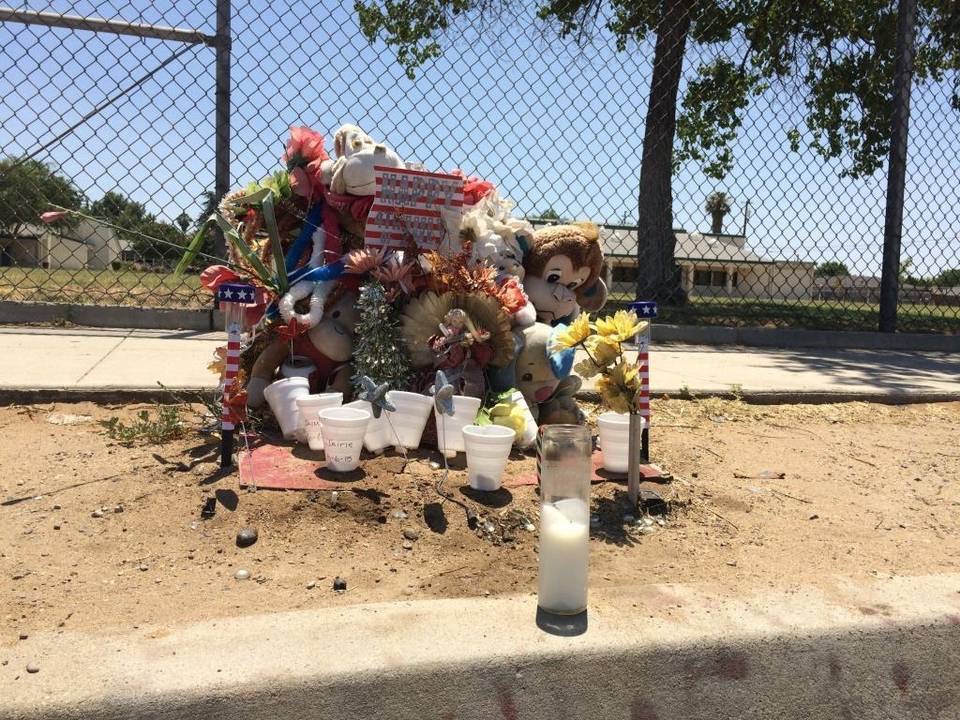Fresno Settles Suit for $2.2 Million. White Cop Fatally Shot Unarmed Latino Man in the Back 3x, Laying on the Ground
 From [HERE] The city of Fresno has agreed to pay $2.2 million to settle a federal civil rights lawsuit filed by the parents of a Latino man who was fatally shot by police four years ago.
From [HERE] The city of Fresno has agreed to pay $2.2 million to settle a federal civil rights lawsuit filed by the parents of a Latino man who was fatally shot by police four years ago.
With the settlement comes major changes for the Fresno Police Department, said Oakland attorneys Michael Haddad and Julia Sherwin, who represented the parents of Jaime Reyes Jr., 28, who was shot while climbing a fence at Aynesworth Elementary School in southeast Fresno in the afternoon of June 6, 2012.
Haddad said Tuesday that if the lawsuit had gone to trial, the evidence would have shown that Officer Juan Avila shot Reyes near the top of the fence. Once Reyes toppled to the ground, Avila shot him three more times in the back as he lay wounded, face down on the ground, Haddad said.
In the settlement, the city does not admit to any wrongdoing by its officers. The suit was filed seeking unspecified damages. Fresno police have shot at least 30 people since January 2012, killing 17. [MORE]
 Fresno police Chief Jerry Dyer, a racist suspect [minister of justice in photo], acknowledged that the city has agreed to review policies and recommend any appropriate minor changes. The city, Dyer said, “has always felt that this tragic shooting was legally justified and settlement should not be viewed as an indication that this view has changed.”
Fresno police Chief Jerry Dyer, a racist suspect [minister of justice in photo], acknowledged that the city has agreed to review policies and recommend any appropriate minor changes. The city, Dyer said, “has always felt that this tragic shooting was legally justified and settlement should not be viewed as an indication that this view has changed.”
According to Dyer, Reyes was a gang member under the influence of methamphetamine who fled from officers while carrying a stolen handgun into a schoolyard occupied by children. “However, circumstances unrelated to the actual incident have dictated that it would be economically sound for the city to settle this matter before incurring the costs of trial,” he said. Blah blah blah.
Haddad disagreed with Dyer’s assessment of facts. He said Reyes never pointed a gun at the officers nor threatened them. After he was fatally shot, officers found a gun in Reyes’ shorts pocket, but the firearm was unloaded and wrapped in a plastic bag.
City officials agreed to the settlement on Nov. 18 in U.S. District Court in Fresno. As part of the settlement, Haddad said the Fresno Police Department has agreed to change its use-of-force policy. Before, officers could shoot a suspect if he posed an imminent threat. “Fresno police have a unique interpretation of what ‘imminent threat’ means,” Haddad said. To police, it means a pending threat or a threat in the near future, Haddad said.
The settlement mandates that Fresno police are only allowed to shoot a suspect if the suspect poses an “immediate threat,” or a threat at this very moment, Haddad said.
Sergeants and patrol officers also will be trained to “assess every shot,” Haddad said. This way, an officer doesn’t fire extra bullets when the situation doesn’t warrant it, Haddad said, noting that Reyes was incapacitated with the first shot, therefore he didn’t need to be shot three more times in the back.
In addition, the settlement requires additional training for homicide detectives and the police Internal Affairs officers. The training will require them to consider statements by witnesses that contradict statements by officers at the scene. In the Reyes shooting, a female witness said she “saw an execution,” Haddad said.
The federal lawsuit filed against Fresno police by Reyes’ parents tells a different account than the police version of events.
The lawsuit accused Avila of failing to give Reyes any warning before shooting. Avila also fired two separate sets of shots. The first bullet wounded Reyes. Avila then fired from the other side of the fence, hitting Reyes as he lay motionless and posed no threat to police, the lawsuit says.
The lawsuit also says Avila and his partner denied first aid to Reyes. Instead, the officers frisked him for weapons and handcuffed him. About 20 minutes passed before paramedics arrived to take Reyes to a hospital. He died during surgery.
The city decided to settle, Haddad said, after a police officer said in a deposition that there was a pause between Avila’s first shot and his next three. If the city hadn’t settled, Haddad said he would have been able to show the jury evidence of other police shootings that he contended were unlawful.

Reyes had a criminal record but no record of violence, the lawyer said. The most serious charge, Haddad said, was for being a felon in possession of ammunition. He pleaded guilty to a felony charge in July 2010 and was sentenced to two years in prison, court records show.
Reyes was one of three children whose mother, Mirella Reyes, works two jobs and whose father, Jaime Reyes Sr., is a truck driver, Haddad said. On the day of the shooting, Reyes’ mother had told police that her son was suffering from a mental disturbance because of methamphetamine use, the lawsuit says, so police should use “special police procedures and tactics” in dealing with him.
“This has been extremely devastating for them because they loved their son very much,” Haddad said Tuesday.